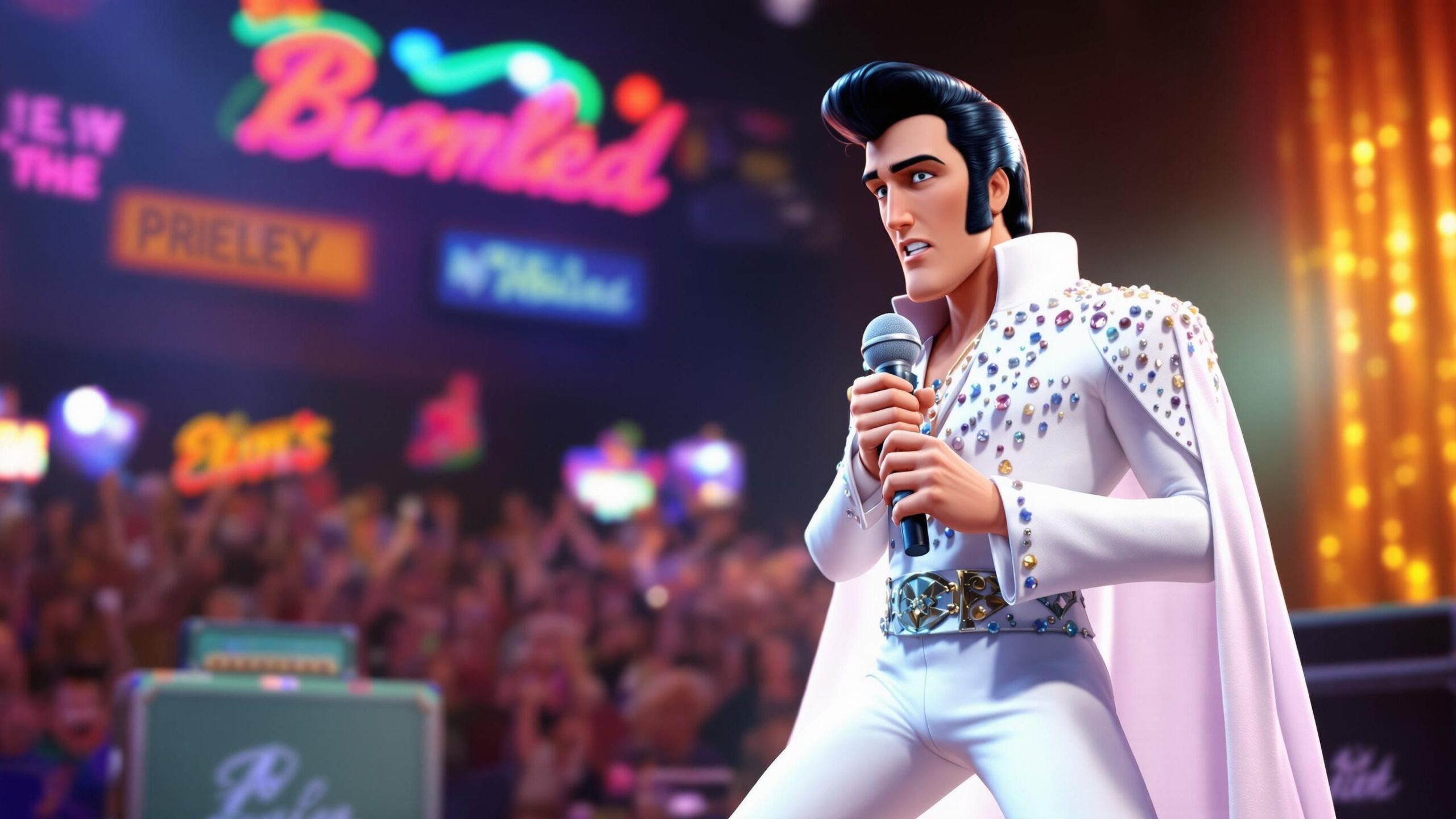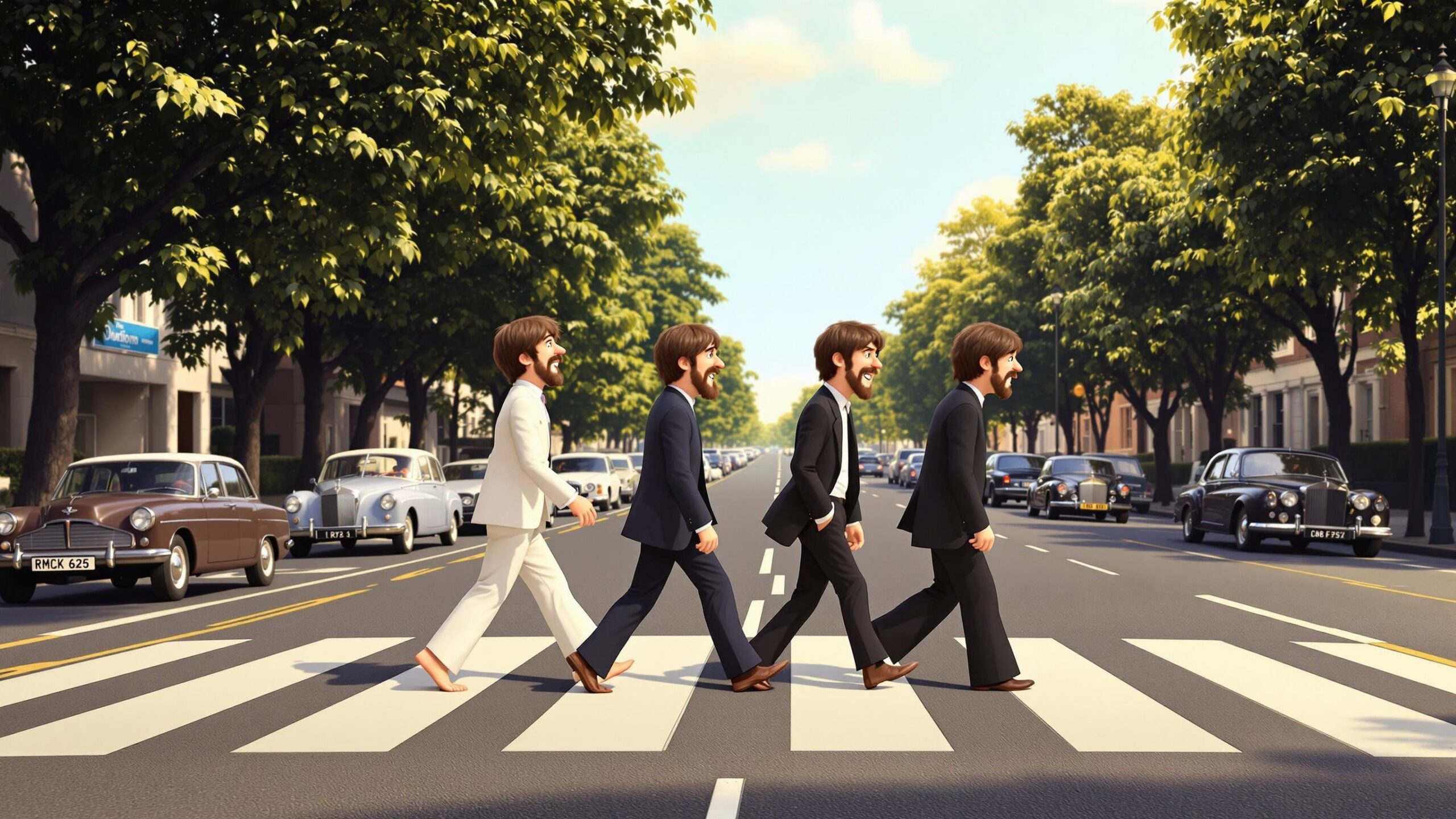In the quiet town of Tupelo, Mississippi, on January 8, 1935, a legend was born in the most humble of homes. Elvis Aaron Presley entered the world in a small two-room house, destined to leave an impact far larger than his roots. Raised in a working-class family with deep ties to gospel and Southern values, young Elvis grew up listening to church hymns, the blues of Beale Street, and the twang of country music. These sounds stirred something deep in him—a passion that would one day explode into a sound no one had ever heard before. By the time he was a teenager in Memphis, Tennessee, he wasn’t just dreaming of music—he was living it. He didn’t know it yet, but Elvis was on the verge of changing the world.
The Birth of a New Sound: Sun Studio Sessions
Elvis’s big break came in 1954 at Sun Studio in Memphis, where he recorded a few demo songs for producer Sam Phillips. What happened next has become rock ’n’ roll folklore. During a break in the session, Elvis began goofing around with an up-tempo version of “That’s All Right,” a blues number by Arthur Crudup. Phillips, ever the visionary, heard something in Elvis’s spontaneous energy. He hit record, and music history was made. That fusion of rhythm and blues, country twang, and gospel soul was unlike anything on the radio. It wasn’t black music or white music—it was both, and it was new. It was rebellious. It was magnetic. Elvis’s first single hit local airwaves and blew up almost overnight. Teens loved him. Parents were baffled. The lines between genres and races blurred. And America had a new sound: rock ’n’ roll.
The Pelvis That Shook the Nation
When Elvis performed on television for the first time, the world didn’t know what hit it. With his slicked hair, dreamy eyes, and hips that defied all decency laws, he was a shock to the system. When he sang “Hound Dog” on The Milton Berle Show and gyrated across the stage, the response was explosive. Critics labeled him vulgar. Churches denounced him. But fans? Fans went wild. Dubbed “Elvis the Pelvis,” he became the poster child of teenage rebellion in 1950s America. His look, his voice, his moves—everything about him was a rebellion against the status quo. And that’s precisely what made him great. With every swivel of his hips, Elvis carved out a new space in music where energy, youth, and raw emotion ruled the day. He wasn’t just performing songs—he was performing freedom.
From Memphis to Hollywood: The King Expands His Kingdom
As the 1950s turned into the 1960s, Elvis’s star only rose higher. After serving in the U.S. Army from 1958 to 1960, he returned to a country eager for his next act. Hollywood was calling, and Elvis answered. Over the course of his career, he starred in 31 feature films, including hits like Jailhouse Rock, Blue Hawaii, and Viva Las Vegas. While not all were critically acclaimed, they solidified his presence beyond music. Elvis was now a full-blown movie star. Though some critics argued that his film career dulled his musical edge, the movies exposed him to a wider global audience and made him a household name. And through it all, his music kept evolving—adding lush ballads, gospel standards, and lush orchestrations to his ever-growing repertoire. But by the mid-1960s, as rock began to shift toward psychedelia and counterculture, some wondered if the King had lost his crown.
The Comeback Special: Black Leather and Redemption
Elvis answered his critics with one of the most iconic television moments in music history. In 1968, after years of formulaic films and a dwindling musical presence, he returned to the spotlight with the ’68 Comeback Special. Dressed in black leather, perched on a small stage with a live band, Elvis looked lean, hungry, and reborn. He ripped through a raw, energetic set of his classics with a fire that hadn’t been seen in years. The performance reignited his career and reminded the world that Elvis wasn’t just a product of the past—he was still the King. His swagger was back, his voice was stronger than ever, and the music world took notice. From that moment on, Elvis re-embraced live performance with a renewed passion, beginning an epic new chapter on the concert stage.
Viva Las Vegas: The Vegas Years and Global Domination
In the 1970s, Elvis became the undisputed king of Las Vegas. Clad in rhinestone-studded jumpsuits, he performed to sold-out crowds at the International Hotel, redefining what a Vegas residency could be. These weren’t just concerts—they were spectacles. With full orchestras, backing choirs, and electrifying charisma, Elvis delivered nightly performances that became the stuff of legend. He also took his show on the road, performing across the U.S. and even beaming one of the first satellite concerts (Aloha from Hawaii) to over a billion people worldwide. It was clear: no one could command a stage like Elvis. He blended country, gospel, rock, and soul into every performance, creating a genre-less experience that thrilled fans of all ages. But behind the glitz, his health and personal struggles were beginning to show.
The Man Behind the Music: Struggles, Humanity, and Heart
For all his fame, Elvis was a deeply human figure—one who battled loneliness, dependency, and the crushing weight of superstardom. He faced the relentless pressure of being the most famous man on Earth, and by the mid-1970s, his lifestyle began to take a toll. Despite this, he continued to perform, pouring his soul into every song and every stage. Friends and bandmates often recalled his generosity, humility, and deep love for gospel music. At his core, Elvis never lost that spark from Tupelo—the boy who loved music, who adored his mother, and who believed in dreams that stretched beyond city limits. Though tabloids fixated on his declining health, fans saw something more: a man who never stopped giving.
The Final Curtain: A Legend’s Passing
On August 16, 1977, the world was stunned by the news that Elvis Presley had died at just 42 years old. Found at his Graceland estate in Memphis, his death sent shockwaves through the music world and beyond. Vigils were held, fans mourned en masse, and a global outpouring of grief echoed through airwaves and streets alike. But death didn’t silence the King. In fact, it magnified his legend. His records sold in the millions. His image, voice, and influence became immortal. Graceland, his home, became a sacred pilgrimage site for fans from every corner of the globe. Elvis may have left the building—but his music never left our hearts.
Legacy of a King: The Echoes Still Resonate
Few artists have had the kind of cultural, musical, and stylistic impact that Elvis Presley achieved. He opened the doors for countless artists—from The Beatles to Bruce Springsteen—who drew inspiration from his fusion of styles, his stage presence, and his fearless embrace of change. Elvis didn’t invent rock ’n’ roll, but he lit a fire under it and launched it into the mainstream. He brought Black musical traditions into white living rooms, challenged conservative norms, and reminded the world that music could shake souls and hips alike. His image is iconic. His voice is unmistakable. His legacy is everlasting.
The King Lives On
Elvis Presley was more than a singer. He was a movement. A pioneer. A bridge between cultures, sounds, and generations. His rise from humble Southern roots to international stardom mirrors the story of American music itself—a blending of traditions, rebellion, and reinvention. More than four decades after his passing, his songs still play, his story still fascinates, and his influence still shapes artists today. He remains, now and forever, the one true King of Rock ’n’ Roll.




